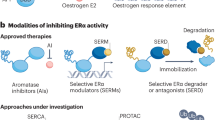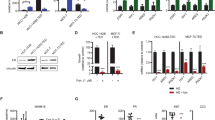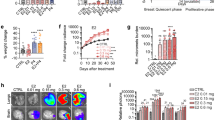Abstract
The effect of idoxifene, a novel anti-oestrogen with less agonist activity than tamoxifen, was compared with that of tamoxifen on the growth of hormone-dependent MCF-7 breast cancer xenografts. Forty tumours were established with oestradiol support in ovariectomized athymic mice, allowed to grow to a median volume of 420 mm3 and then continued with oestradiol, no support, tamoxifen or idoxifene delivered by 1.5-cm silastic capsule. Tumour regression occurred with both anti-oestrogens, although maximum regression was observed following oestradiol withdrawal alone. While prolonged anti-oestrogen therapy was associated with static growth, tumour volumes were significantly lower with idoxifene (P=0.01). After 6 months, 0/10 idoxifene-treated tumours developed acquired resistance compared with 3/10 tumours treated with tamoxifen. In separate experiments, 94 animals were treated initially with oestradiol, tamoxifen, idoxifene or placebo following implantation with 1-mm3 pieces of either wild-type (WT) or tamoxifen-resistant (TR) MCF-7 tumour. After 4 months, only 1/11 WT tumours became established with idoxifene compared with 4/11 with tamoxifen, 8/12 with oestradiol and 0/12 with placebo. Likewise, fewer TR tumours were supported by idoxifene (3/12) than by tamoxifen (8/12) or oestrogen (11/12). These data indicate that, compared with tamoxifen, idoxifene shows reduced growth support of MCF-7 xenografts and may share only partial cross-resistance. Furthermore, the development of acquired anti-oestrogen resistance may be reduced during long-term idoxifene therapy. The drug's reduced agonist activity may, in part, explain these observations and indicate a preferable biochemical profile for breast cancer treatment.
This is a preview of subscription content, access via your institution
Access options
Subscribe to this journal
Receive 24 print issues and online access
$259.00 per year
only $10.79 per issue
Buy this article
- Purchase on Springer Link
- Instant access to full article PDF
Prices may be subject to local taxes which are calculated during checkout
Similar content being viewed by others
Author information
Authors and Affiliations
Rights and permissions
About this article
Cite this article
Johnston, S., Riddler, S., Haynes, B. et al. The novel anti-oestrogen idoxifene inhibits the growth of human MCF-7 breast cancer xenografts and reduces the frequency of acquired anti-oestrogen resistance. Br J Cancer 75, 804–809 (1997). https://doi.org/10.1038/bjc.1997.144
Issue Date:
DOI: https://doi.org/10.1038/bjc.1997.144



